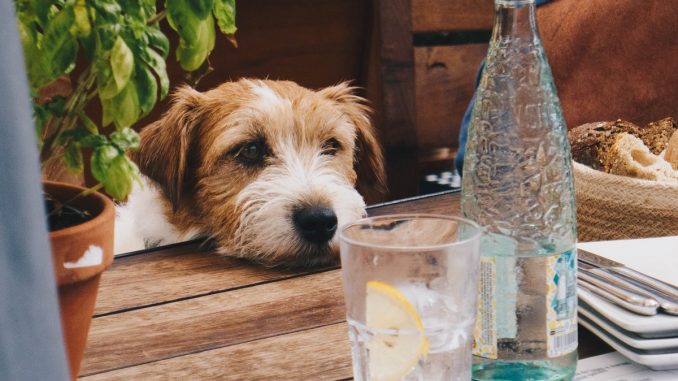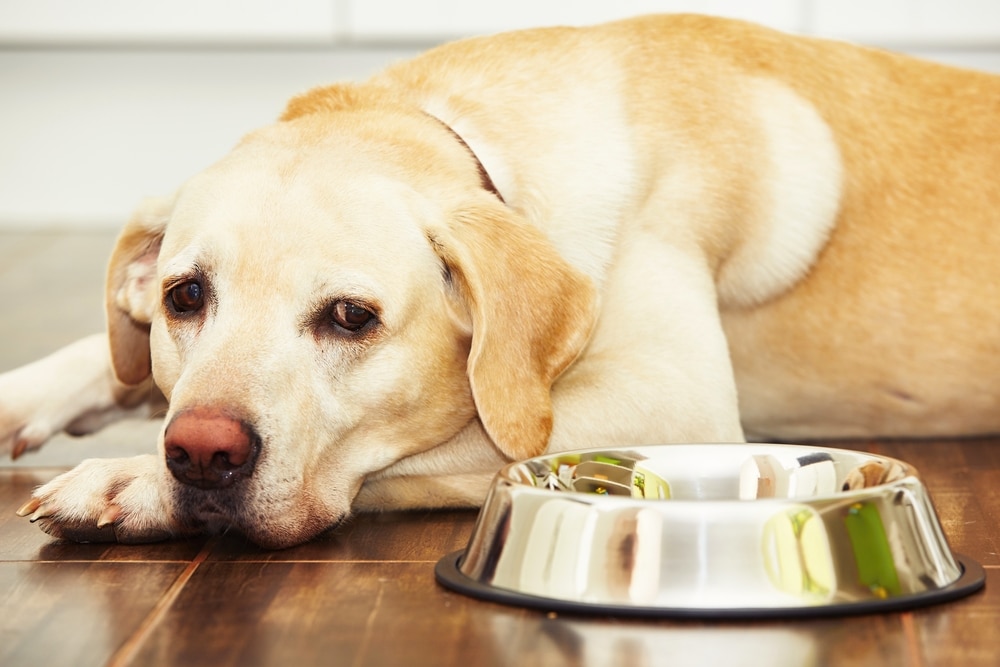
Few issues concern a dog owner like when their furry friend will not eat its food. Like humans, dogs must consume an appropriate amount of nutrients and calories to stay healthy and strong.
If you are concerned that your dog is not eating enough food or it will not eat any food at all, we are here to help you understand some of the potential causes. We will also explain how long a dog can go without eating. From there, we will also explain how long a dog can go without drinking water, as not drinking water often accompanies a loss of appetite.
If you are worried that your dog is not eating or drinking enough, we are here to help by providing some answers!
Contents
- How Long Can a Dog Go Without Eating?
- How Long Can Dogs Go Without Drinking Water?
- What if Your Dog is Already in Poor Health?
- Why Is Your Dog Not Eating?
- Physical and Medical Conditions That Can Cause a Loss of Appetite
- Mental Conditions That Can Cause a Loss of Appetite
- What if Your Dog is Just a Picky Eater?
- Final Words
How Long Can a Dog Go Without Eating?
While there is some variation, most dogs can go about three to five days without consuming any food. While it is possible to survive longer than five days, it is fair to say that some serious health issues can present themselves if a dog does not consume any food after three days.
If you notice that your dog will not eat any of its food, there is plenty that you can do; however, if more than three days have elapsed and your dog has not eaten anything, you should immediately consult your veterinarian. In most cases, it is worth bringing the dog in for a checkup immediately as such a drastic loss of appetite can be a sign of a serious health issue. Ideally, you would not wait nearly as long as three days. If you can, take your dog in after a single day of not eating, as time can be critical in these situations, so you should act as quickly as possible.
How Long Can Dogs Go Without Drinking Water?
As with humans, not drinking water is much more dangerous for dogs than not eating food. While it is certainly possible for a dog to survive for slightly longer, a dog’s life is in danger if it does not drink any water for two to three days.
If you notice that your dog has not drunk any water in a full day, you should check for signs of dehydration and consult your veterinarian as soon as possible. To help you identify the issue, we will explain some common signs of dehydration a bit later.
What if Your Dog is Already in Poor Health?
If your dog suffers from any health issues, starvation and dehydration can worsen its condition quickly. No matter what your dog’s health is, keep an eye on how much food and water they consume daily. If you notice a difference in you dog’s appetite or how thirsty they are, you should bring this up with your veterinarian as soon as you can.
Why Is Your Dog Not Eating?
If you are wondering how long a dog can go without eating, there is also a good chance you have questions about why your dog is not eating its food.
While a drastic loss of appetite that has lasted more than a day should always be met with a visit to a veterinarian, one of the following conditions is usually the reason why a dog will not eat:
Physical and Medical Conditions That Can Cause a Loss of Appetite
- Severe and Chronic Allergies – In some cases, a serious allergic reaction can cause your dog to lose its appetite. While all types of allergies can impact a dog’s appetite, food-related allergies tend to be the most common cause.
- Physical Pain – Since dogs cannot simply communicate their pain, they often express it in seemingly unusual ways. Many dogs experiencing severe pain will respond by refusing to eat their food or drink from their water bowl. This pain could be due to a recent wound or a long-standing injury. In many cases, arthritis pain, which is particularly common in senior dogs, can result in a loss of appetite.
- Serious Health Issues – While it is an unpleasant thought, if a dog is refusing to eat its food, it could be an indicator of a serious health condition, such as cancer, diabetes, internal bleeding, or a variety of digestive issues. This is why you must bring your dog in as soon as possible if you notice it will not touch its food. In just about every situation, the faster a health issue is identified, the better the chances are that the veterinarian can help.
- Infections or Parasites – Refusing to eat can also indicate that a dog has a parasite or is suffering from an infection. Again, this is why you must take your dog to see a veterinarian if you notice an ongoing loss of appetite. A veterinarian will be able to perform a blood test to determine whether or not your dog is suffering from an infection or parasite.
- Dental Issues – In many cases, a loss of appetite indicates that your dog is suffering from a dental issue. When plaque and tartar build on the teeth of a dog, they can spread into the gumline. When this occurs, the dog can begin to suffer from gingivitis. Not only can gingivitis inflame the gums and cause pain, but it can also spread into the jawbone, which can lead to very severe issues for your dog. If your dog will not eat, inspect its teeth. There is a chance your dog is not eating because it hurts to bite and chew. Just as it is for humans, dental hygiene and health are very important for your dog’s overall health.
- Recent Surgery – Nausea and lack of appetite are common side-effects of many types of surgery. Not only is the surgery itself a stressful and confusing experience for the dog, sometimes the anesthesia can cause your dog to feel nauseous. If your dog will not eat or drink for more than a day after surgery, it could be a sign of a more serious complication and you should immediately let your veterinarian know.
Mental Conditions That Can Cause a Loss of Appetite
While the physical conditions highlighted above almost always require medical treatment, there are also mental issues that can reduce your dog’s appetite. Just like humans, dogs can suffer from mental issues, like depression and anxiety. If your dog will not eat or drink, there is a chance it could be suffering from these issues.
Anxiety-Related Appetite Issues in Dogs:
Anxious dogs, especially those that suffer from chronic anxiety, can lose their appetite. In addition to a complete or partial loss of appetite, signs that your dog could be suffering from severe anxiety can include the following:
- Abnormal levels of aggression
- Regular and persistent trembling and shaking
- Irregular amounts of barking and other unexplained vocalizations
- Growling regularly, especially when it seems difficult to find an explanation for it
- Hiding and exhibiting other signs of shyness, such as running away from people
- Tucking the tail between the legs
- General panic when taken outside of the house, or if the owner is about to leave the house
- Aversion to contact, especially if that behavior was rarely exhibited in the past
While there are other signs of anxiety in dogs, those mentioned above are some of the clearest. If you notice your dog will not eat its food and is also demonstrating one or more of the above-mentioned symptoms, it might be worth discussing treatment options with your veterinarian.
There are some helpful training and therapy techniques you can follow to reduce the severity of anxiety. In severe cases, there are also prescription medications that help dogs overcome their anxiety issues. Your veterinarian will be able to diagnose your dog’s anxiety and discuss treatment options with you.
Helping Your Dog Overcome its Anxiety:
While chronic anxiety can be a very serious issue, there are some things owners can do to help their dogs. These include the following:
- Consider spending more time with your dog, especially if the dog is left alone for long periods while you are away at work. Separation anxiety is a common issue for dogs, so when you can, you should spend some quality time with your dog. Just because your dog is no longer a puppy does not mean you should stop playing together. Invest in some fun dog toys and make an effort to enjoy walks and playtime with your pup, no matter how old it is.
- If you know your dog will be exposed to a stressful situation, such as a thunderstorm, or a planned party in your home, make sure you give your dog space and a place where it can be alone. In most cases, dogs do not do well with loud noises and major changes in their environment. Even if you have a social dog, you do not want them to feel smothered or trapped by guests. Consider setting aside a room that the dog likes to spend time in. Dim the lights in that room and make sure the door is left open so the dog can retreat to that space. Ask any guests to stay out of that room so the dog can have some space.
- Make sure you properly socialize your dog, so it will not be scared or anxious around others, meaning teaching your dog how to be around other people, as well as other dogs. This is especially important if you have a puppy, but despite what you may think of older dogs learning new things, you can still do quite a lot to help them feel comfortable around others and new environments. Just make sure you do so at a pace that the dog is comfortable with.
Depression-Related Appetite Issues in Dogs:
Just like dogs can suffer from anxiety issues, they are also susceptible to depression. In addition to a loss of appetite, a dog suffering from depression can exhibit one or more of the following symptoms:
- Unusually frequent and lengthy episodes of lethargy. If your dog was once playful and active, but suddenly seems like it is uninterested in playing or going outside, it could be a sign that the dog is experiencing some level of depression.
- Major changes in the dog’s sleep schedule. If your dog used to sleep during the night, but now seems restless and only sleeps throughout the day, it could be experiencing depression.
- A general sense of indifference to things the dog once enjoyed and got excited about. If you notice that your dog is less excited to see you, other dogs, its toys, and even treats, it is possible that it could be suffering from depression. If the dog will not eat its food or any treats that you offer, it could be a sign of depression, as well as a variety of other physical and mental health issues.
It can be difficult to diagnose depression in dogs as they cannot simply communicate how they are feeling, so it is important to consult with your veterinarian if you notice any significant and ongoing changes to the dog’s behavior.
While we are now making progress in recognizing and accepting mental health issues in humans, as a pet owner, it is also important to remember that dogs and other animals can also feel anxious and depressed. In many cases, a loss of appetite or a complete refusal to eat or drink can be a clear sign that your dog is suffering.
What if Your Dog is Just a Picky Eater?
While your dog might be a fussy eater and dislike its food, there is a difference between a total refusal to eat and a dog that does not seem to enjoy the food you provide. If you have recently moved your dog to a new brand or flavor of dog food and notice that they will not eat, you might have an adjustment issue. In this case, it can be worth waiting it out as the dog will eventually eat when it gets hungry.
If your dog is on a prescription diet and it will not eat the new food, there are things you can add to the food to make it more appetizing. For example, some people will add a small helping of unseasoned scrambled eggs to their dog’s food to encourage the dog to eat it. You can discuss options with your vet if you suspect that your dog simply does not like the food or diet it has been prescribed.
On the other hand, if you have not made any changes to your dog’s diet, but you still notice a major loss of appetite, there is a good chance that it is a sign of one of the physical or mental health issues we discussed above.
Final Words
No matter how your dog’s loss of appetite presents itself, the best thing to do is get to the root of the problem as quickly as possible. While being aware of the potential reasons why a dog will not eat can be useful, the best thing to do is get your dog to a veterinarian, especially if the problem has continued for more than a day.
As always, use your discretion when evaluating your dog’s eating habits. If the dog will eat but is less enthusiastic, the problem might be less urgent, but you should still speak with your dog’s veterinarian. On the other hand, if the dog has not eaten anything for over a day and turns its nose up to treats, you should see a veterinarian immediately. Not only is malnourishment a concern, a refusal to eat anything is almost always a sign of a more serious medical condition.
As always, the best thing you can do is keep an eye on your dog. After all, as a dog owner, you are in charge of your dog’s health and well-being, so be the best dog owner you can be and look out for your pooch!

